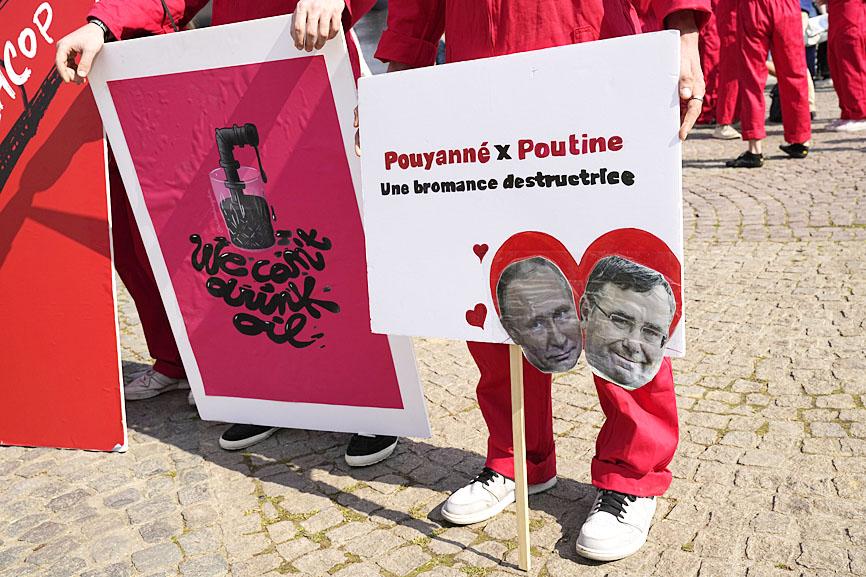TotalEnergies SE does not plan to divest its Russian assets amid the war in Ukraine, as doing so would essentially mean handing them over to Russian President Vladimir Putin, TotalEnergies chief executive officer Patrick Pouyanne said.
“For me it’s a question of accountability and the responsibility of the offshore stakeholders,” Pouyanne told a conference in Doha on Saturday. “Do I give them for free to Mister Putin? Because this is what it means leaving today and giving my shares.”
The French energy firm earlier last week said it would no longer sign or renew contracts to buy oil and petroleum products from Russia, with the aim to halt all purchases by the end of this year at the latest, and has begun “gradual suspension” of Russian operations, the company said in a statement.

Photo: AP
The war in Ukraine has sent shockwaves through energy markets, pushing oil and natural gas prices higher, and causing many buyers to shun Russian crude. Some of the world’s largest oil companies — including Shell PLC, BP PLC and Exxon Mobil Corp — have pledged to exit Russia, reducing capital available for investment.
TotalEnergies has said it would no longer provide capital for new projects there.
“They do what they want, and we do what we want,” Pouyanne said of his company’s international peers.
BP and Shell have also said they would not make any new purchases of Russian oil and gas, but would not immediately be able to disentangle themselves from the country due to long-term contracts and the difficulty to find alternative supplies.
TotalEnergies does not operate any oil or natural gas fields in Russia, nor any liquefied natural gas (LNG) plants. It is a minority shareholder in several non-state-owned Russian companies. It owns about one-fifth of gas producer Novatek PJSC, as well as a large interest in the Yamal LNG project, Russia’s biggest producer of the commodity.
Pouyanne said his company finances plants in Russia, but that “they are operated by a Russian company, which can do it without us. This plant will continue to produce, whether or not we stay.”
In its statement on Tuesday, TotalEnergies condemned Russia’s invasion and said it would ensure strict compliance with European sanctions, “no matter what the consequences on the management of its assets in Russia.”
French Minister of the Economy, Finance and Recovery Bruno Le Maire said earlier this month that TotalEnergies is not contravening any sanctions.
The US and UK have taken steps to ban imports of oil from Russia, but EU countries have been divided on the issue. Still, the bloc is racing to reduce its dependency on Russian energy sources. The country supplies about 40 percent of the natural gas consumed in the EU.
Qatari Minister of Energy Saad Sherida al-Kaabi said his gas-rich country would not “immediately” be able to help Europe with energy supplies to replace those from Russia.
“The volume we’re talking about — the 30 percent to 40 percent coming from Russia to Europe — is not something that can be replaced overnight,” he said.

JITTERS: Nexperia has a 20 percent market share for chips powering simpler features such as window controls, and changing supply chains could take years European carmakers are looking into ways to scratch components made with parts from China, spooked by deepening geopolitical spats playing out through chipmaker Nexperia BV and Beijing’s export controls on rare earths. To protect operations from trade ructions, several automakers are pushing major suppliers to find permanent alternatives to Chinese semiconductors, people familiar with the matter said. The industry is considering broader changes to its supply chain to adapt to shifting geopolitics, Europe’s main suppliers lobby CLEPA head Matthias Zink said. “We had some indications already — questions like: ‘How can you supply me without this dependency on China?’” Zink, who also

The number of Taiwanese working in the US rose to a record high of 137,000 last year, driven largely by Taiwan Semiconductor Manufacturing Co’s (TSMC, 台積電) rapid overseas expansion, according to government data released yesterday. A total of 666,000 Taiwanese nationals were employed abroad last year, an increase of 45,000 from 2023 and the highest level since the COVID-19 pandemic, data from the Directorate-General of Budget, Accounting and Statistics (DGBAS) showed. Overseas employment had steadily increased between 2009 and 2019, peaking at 739,000, before plunging to 319,000 in 2021 amid US-China trade tensions, global supply chain shifts, reshoring by Taiwanese companies and

Taiwan Semiconductor Manufacturing Co (TSMC, 台積電) received about NT$147 billion (US$4.71 billion) in subsidies from the US, Japanese, German and Chinese governments over the past two years for its global expansion. Financial data compiled by the world’s largest contract chipmaker showed the company secured NT$4.77 billion in subsidies from the governments in the third quarter, bringing the total for the first three quarters of the year to about NT$71.9 billion. Along with the NT$75.16 billion in financial aid TSMC received last year, the chipmaker obtained NT$147 billion in subsidies in almost two years, the data showed. The subsidies received by its subsidiaries —

At least US$50 million for the freedom of an Emirati sheikh: That is the king’s ransom paid two weeks ago to militants linked to al-Qaeda who are pushing to topple the Malian government and impose Islamic law. Alongside a crippling fuel blockade, the Group for the Support of Islam and Muslims (JNIM) has made kidnapping wealthy foreigners for a ransom a pillar of its strategy of “economic jihad.” Its goal: Oust the junta, which has struggled to contain Mali’s decade-long insurgency since taking power following back-to-back coups in 2020 and 2021, by scaring away investors and paralyzing the west African country’s economy.